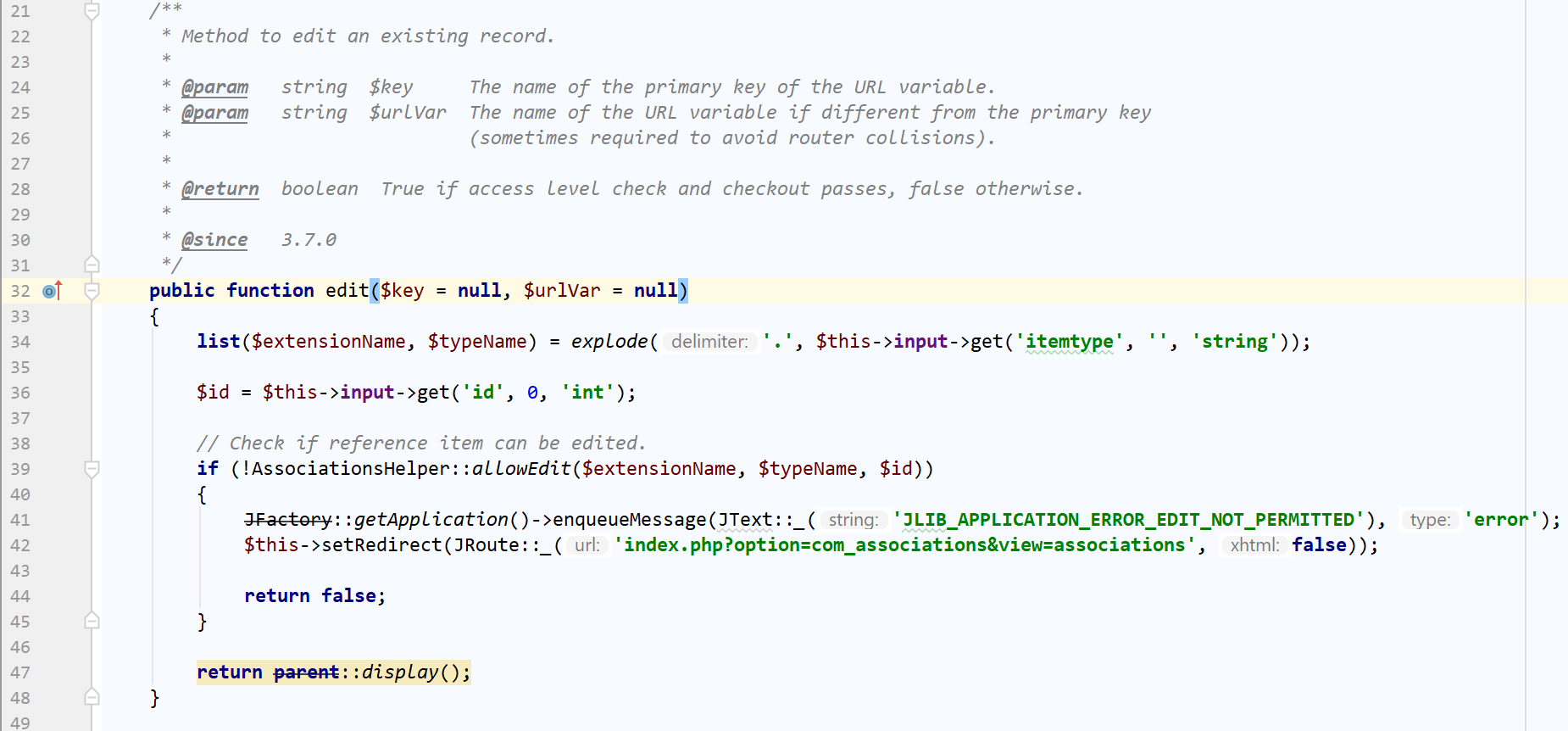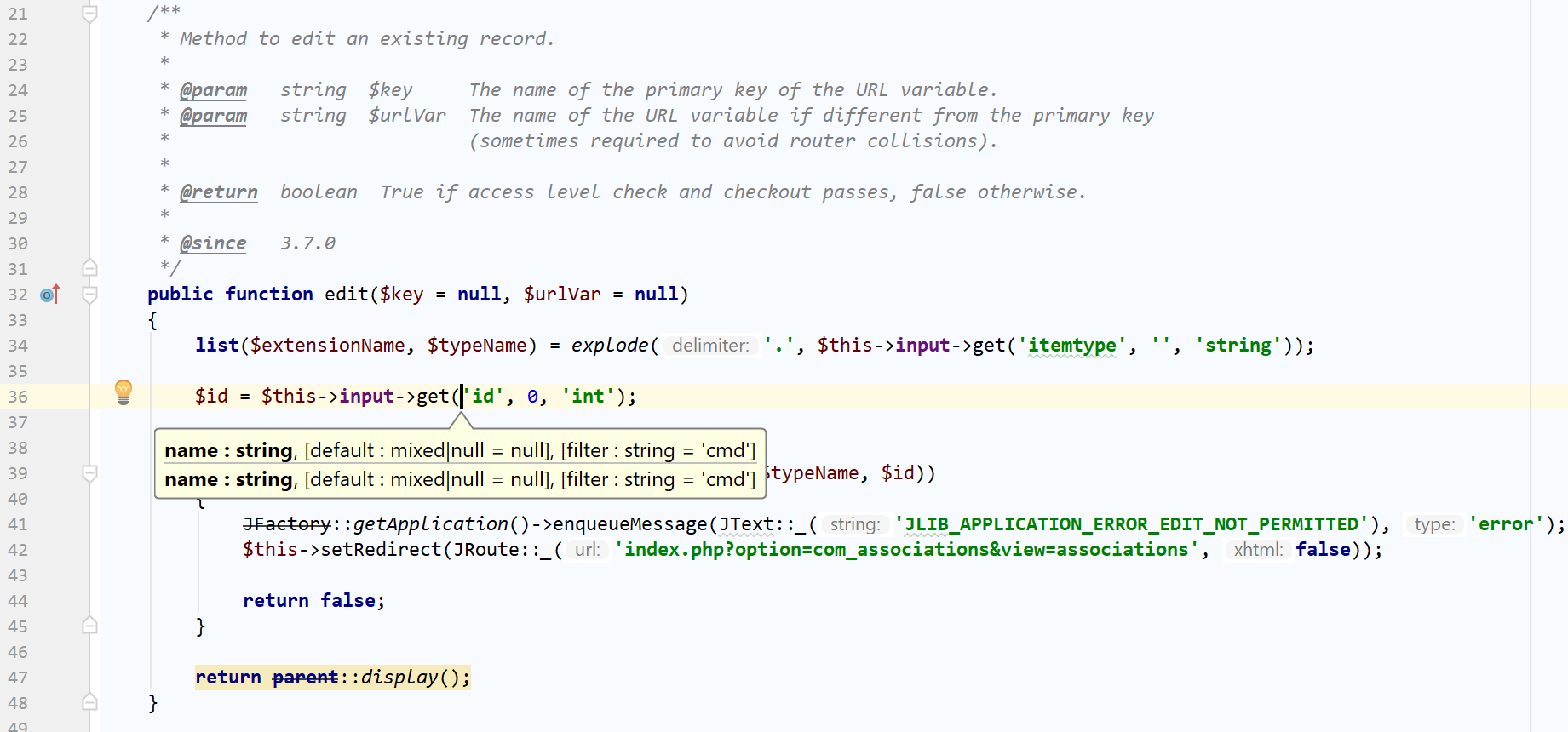Joomla! 3.10/4.0 was when the last few non-namespaced Joomla! core classes were replaced by namespaced equivalents.
Joomla! 5 marked the end of built-in support for non-namespaced Joomla! core classes, with optional compatibility offered through the Behaviour - Backward Compatibility plugin.
The time to complete your transition to namespaced classes lapsed in October 2023 with the release of Joomla! 5.0. If you still have not done that, you can still use the Rector helpers in this repo to make your Joomla! 4 software compatible with Joomla! 5 and later. But since there are no more legacy classes to migrate, this repository no longer serves any practical purpose and is archived as of end July 2024.
Generate code type hints for deprecated core Joomla! API classes
Did you find this useful? Please buy me coffee or lunch :) Include your Twitter handle for a public thank-you!
It lets your IDE provide code completion for the old core Joomla! API classes which have been deprecated and replaced with their namespaced counterparts.
A picture is worth a thousand words. Here's Joomla! 3.8 staging branch on phpStorm.
Before
After
Clone this repository and initialize Composer dependencies in it
git clone https://github.com/nikosdion/joomlatypehints.git
cd joomlatypehints
composer installYou can create typehints against either a published version of Joomla! or a Joomla! installation on your computer. The latter is useful for core development against the staging branch.
Against a published Joomla! version, e.g. 3.7.4
php typehints.php generate --for-version=3.7.4Ninja developer tip: The --for-version argument also accepts any published GitHub branch name for the joomla/joomla-cms repository. For example, if you want to generate typehints for the current staging branch:
php typehints.php generate --for-version=stagingAgainst a Joomla! installation, e.g. /var/www/joomla-cms
php typehints.php generate --for-site=/var/www/joomla-cmsBy default the typehint classes are output in the generated_hints folder. You can change that by passing a folder name to the
command (the folder must already exist). For example:
php typehints.php generate --for-site=/var/www/joomla-cms /var/www/joomla-cms/typehintsInvoke the application without any parameters to get help. It's self-documenting!
- Go to File, Settings.
- From the left hand tree select Language & Frameworks, PHP.
- Click on the Include Path tab.
- Click the [+] button to the right hand of the include path list.
- Select Specify Other... and select the generated class hints folder.
Upgrading your Joomla extensions to use the new, namespaced classes by hand is a drag. It will take you ages, especially if you have a rather large corpus of code you've been developing for over a decade like we do at Akeeba Ltd.
The solution to that is Rector, a tool for automatically refactoring PHP code.
This repository ships with PHP configuration files for Rector which will automatically rename legacy classes to their namespaced equivalents. The PHP files are generated automatically in the same way as the typehints files.
Here's how to do it.
First, find the file with the minimum Joomla version your codebase supports. For example, if you want to support at
least Joomla 3.8 you need the file joomla_3_8.php.
Copy this file into the root of your repository and rename it to rector.php.
Now run:
docker run -v $(pwd):/project rector/rector:latest process /project --config /project/rector.php --dry-run
to see the changes Rector will do to your repository. Skip the --dry-run parameter to apply the changes to your code.
Always go through your code and test your extension BEFORE committing anything to your repository. Rector makes things easier for you but it's not infallible.
Tip: Instead of going all in with a minimum Joomla version try building up to it. For example, if your software only
supports Joomla 3.9 and later start by running Rector with the joomla_3_3.php file. Review and test your code, commit
and then repeat the process with the joomla_3_4.php file. Keep doing that for each file up to and including
joomla_3_9.php.
It reads Joomla's libraries/classmap.php file and generates fake class files so that the deprecated class extends from the new, namespaced class. You have to include these files in your IDE's class search path for code completion to work.
For example, JRegistry stopped existing as a standalone class in Joomla! 3.3.0. It was replaced by \Joomla\Registry\Registry.
Any code which was typehinted to JRegistry stopped showing code hints to developers since 3.3.0.
This utility creates a fake class definition file for this class in the form
/**
* @deprecated 4.0
*/
class JRegistry extends \Joomla\Registry\Registry {}This lets your IDE know that even if you have used JRegistry in your DocBlocks / PHP 7.x type hints it should provide code
completion for the new \Joomla\Registry\Registry class. At the same time your IDE will mark the old JRegistry class as
deprecated (if it supports such a feature) so you can eventually refactor it to the new class name.
Yes, it does and it goes most of the way but not all of the way. It does give you the mapping of legacy to namespaced classes which are available in your Joomla version. It does tell you when they become obsolete.
It does not help you if you have a legacy code base using legacy Joomla classes which are no longer available in the Joomla version you are trying to use. For example, trying to target Joomla 4.0 means that you no longer have certain legacy classes which were deprecated in 3.x and removed in 4.0. Good luck trying to figure that out.
Moreover, it makes no sense going through your code base manually to change legacy classes to their namespaced equivalents. It's dull, it takes too long and there's a lot of room for mistakes. Using Rector is a far better solution. Why build your own Rector configuration when you can have it automatically generated for you?
Finally, you don't get a handy reference with all of the classes, when their namespaced variant was introduced and when the legacy class will be retired. This is invaluable if you're developing against a newer Joomla version but you're trying to target older versions as well. Same goes for trying to figure out which is the minimum version of Joomla you can reasonably target without having to pepper your source code with endless if-blocks whenever you're using a namespaced class you're not sure when it was introduced.
This project is not affiliated with or endorsed by the Joomla! Project. It is not supported or warranted by the Joomla! Project or Open Source Matters. Open Source Matters is the trademark holder of the Joomla! name and logo in the United States and other countries. The Joomla! name is used by this project according to the fair use doctrine.


